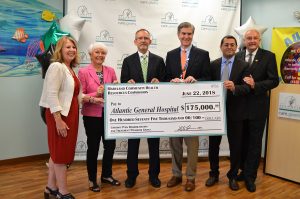
BERLIN – A $175,000 grant is expected to benefit a new pain rehabilitation program at Atlantic General Hospital.
Last week, Allan Anderson, chair of the Maryland Community Health Resources Commission (CHRC) presented Atlantic General Hospital (AGH) with a $175,000 grant for the hospital’s new pain rehabilitation program at Atlantic General Pain Center.
“This is the first time a unique program like this has looked at the whole person,” Anderson said. “We have funded some really good programs with medications and assisted treatments, but this is a unique program that looks at the patient as a whole and looks at them from a very integrated, team approach.”
The new Chronic Pain Rehabilitation and Treatment Program – led by pain management and intervention specialist Dr. Wadid Zaky – is a 10-day program that gives patients access to medically driven pain management, vocational support, integrative health therapies such as meditation, message and guided imagery, physical and occupational therapy and behavioral health care.
Zaky said the new pain management program is designed to improve the quality of life for individuals with chronic pain and reduce their dependence on opioid medications.
“The goal of this program is at the end we are hoping that we can help reduce the patient’s dependence on opioids … or even have them stop them completely,” he said.
Michael Franklin, president and CEO of AGH, said the hospital has made strides to provide better mental and behavior health programs in recent years and noted the decline in overdose deaths in Worcester County. He argued, however, that the new pain management program would target problems that lead to opioid addiction.
“By breaking the cycle of pain, we can hopefully help break the cycle of addiction using efforts other than procedures and addictive medications,” he said.
Anderson said the Chronic Pain Rehabilitation and Treatment Program is one of three programs on the lower Eastern Shore to receive a grant from the CHRC this year and the first of its kind to offer innovative pain management services. He said the new pain management program at AGH could be a model program for other hospitals around the state.
“We look for programs that are innovative as well as replicable and sustainable,” he said. “I think this is a very cool and very unique, innovative program.”
State Senator Addie Eckardt praised the CHRC for funding programs that tackle public health issues.
“We believe it’s become an incubator for innovative programs in health that will ultimately save money,” she said. “It’s been really exciting to see partners come together and put forward proposals to address the complex issue of addiction and pain management and mental illness.”
State Senator Jim Mathias said the new program offers a different approach to pain management and the opioid epidemic.
“We just can’t do it the same way, bring patients in, treat them, let them go, bring them back again, readmit them. We can’t do that,” he said. “We have to be better at what we do and that’s what the commission is doing, that’s what the commitment of our people are doing and that is what Atlantic General Hospital is doing.”
Delegate Mary Beth Carozza said AGH should be proud to secure funding from the CHRC.
“They receive countless proposals across the state and you have to be good and you have to be detail-oriented and you have to have results, so you have earned this grant …,” she said. “My challenge to you is let’s show great results with this program.”
Since its inception, the CHRC has given out $64.1 million in grants. Approximately 107 of its 210 grants have supported health programs in rural areas.
The $175,000 grant from the CHRC is expected to fund the Chronic Pain Rehabilitation and Treatment Program over a two-year period.

